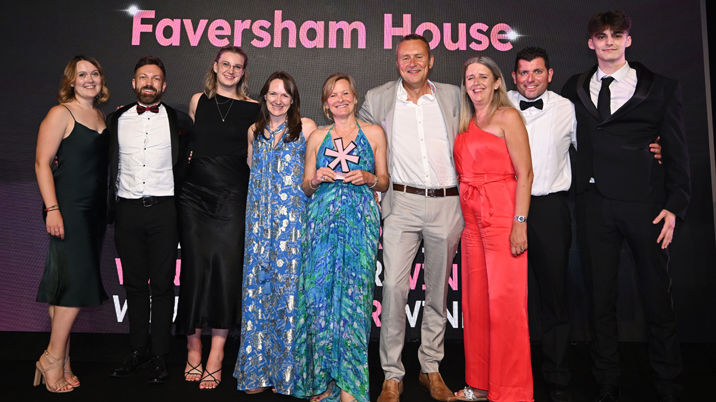
When Carl Myers and I did our original management buyout back in December 2010, we did it with the help of private equity. Coming from the roots of a family company founded by my dad and his business partner back in 1960, how we did business was as important as the business itself.
We rather confused our new private equity partners as the first exercise we did with them was around determining our values and purpose. It wasn’t as common as it is now to be purpose-led and we were probably their only client who spent an equal amount of time on these bigger, more nebulous issues as we did on product strategy and finance. They certainly looked confused when asked to relate their personal values to work!
Three core values
This exercise involved everyone in the company and that’s where we came up with our original purpose — to spark ideas and actions — and our three core values: we are ambitious, creative and we care. The purpose has evolved over time “to spark ideas and actions to make positive change happen” as we want to help all the businesses we work with make the difference with business acting as a force for good. This fits very closely with our edie and Utility Week brands where the focus on the transition to net zero is key.
I believe we truly embody our values though it has taken a long time plugging away to get the company there. Company culture underpins a successful company, especially when the going gets tough as it did in the pandemic. We found using our values and our purpose as a touchstone for decision making very valuable; it helped us remodel the business. Our care value — love what you do and do what’s right — was particularly important and we tried hard to ensure our decisions were transparent and effectively communicated, even when they were hard ones.
Care for us isn’t a woolly value, it also relates to the professionalism we apply to all we do. We form long-term relationships with our people, our audience, our clients and our supply chain. In purely business terms, this helps people know what to expect from us and that makes for much better, trust-based relationships. It can have real business impact and I am sure was one of the reasons almost all our clients left their exhibition cash with us for three years before we were able to deliver our shows.
Purpose and values have to be real to be believed in. You need to relate everything you do back to them and make them come alive so people understand how to embody them. And, most importantly, senior management has to believe and live them. It isn’t as simple as a slogan on the wall, although that can be an effective way of reminding people. It was a very long process for us though now I think they are second nature and we refer to them a lot.
We have a section in our personal development plans devoted to giving examples of how someone has exhibited these values in their behaviour and their work throughout the year; we run a comprehensive induction programme around the values where we explain what they mean, the language we use in the company and how it is all linked to a new paradigm, growth culture. This is especially helpful in maintaining a strong company culture in an era of flexible and remote working.
Management training
What doesn’t work is insincerity; people need to understand the story and see it in action, especially in their managers. We’ve spent a long time on management training, developing our own Managers’ Toolkit and looking at the behavioural science behind the tools we use. It’s all grounded in psychology and our belief in treating people respectfully. Of course, we don’t always get it right and that’s OK too as long as you learn and move on positively. We try to have a culture where it’s ok to make mistakes provided you take responsibility for them and grow. That’s very easy to say and often difficult to do. That other great aphorism, ‘don’t let perfection get in the way of good’, is a useful one to remember.
We have found distributing responsibility through the company and not always to managers to make things happen is very effective. We have self-appointed committees leading well-being, entertainment activities, sustainability (recently renamed SAS for Sustainability Action Squad).
I’m particularly keen on promoting wellbeing and we offer plenty of support and resources the company pays for, whether that’s private health cover, an employee assistance programme or annual physical health MOTs together with some great app based mental health tools. We also have trained mental health first aiders and the list goes on. Not everyone takes us up on this, however, a sufficient number of people do and I know it’s made the difference in some difficult circumstances. I think the return from a company perspective is enormous, not simply improving retention; it means people get back to full health again much quicker and that benefits them and us.
Fundamentally, all the frills and benefits in the world are not going to keep people working for you if the work is not rewarding, if people don’t have autonomy and you don’t pay them well enough. We’re a small company and we expect a lot from people. If you do that, you need to make sure the value equation works for them as well.
Increased profits
I know all this works; I just have to look at the growth we’ve experienced since the pandemic and how our profitability keeps increasing. Our staff retention has improved significantly and for a small company, this is important as no position isn’t significant and given how hard it still is to recruit the right people, empty seats cost money. Inevitably, people do sometimes need to leave to grow though we have a good number who come back too, often to a more senior position as they’ve honed their skills elsewhere.
We’ve noticed a trend among those looking to join us, especially younger people. They want a company they can be proud to work for and they do want to make a difference to the world. We’re very lucky working in the sectors we do as our two main markets, sustainability and utilities, are pivotal to a just transition and that appeals to people.
We also become a Certified B Corporation in February this year, qualifying with 103.3 points (minimum is 80), a feat I’m immensely proud of. It was a long hard slog at times and required a fundamental shift in mindset. Certainly not a tick box exercise. It’s been amazing to see how the company has embraced it and now we’re busy rolling out the best parts to our supply chain and our customers. It’s certainly opening doors for us.
We try to have a focus each year and we have a tight set of board KPIs spanning all aspects of the business from our people strategy, finance, product, sustainability, AI to name a few. They are interwoven and dependent on different people and parts of the business to deliver. Sometimes, you feel like the conductor of an orchestra. This year, our people focus is on training and development. We want everyone in the company to devote 5% of their paid time to learning. We’ve invested in LinkedIn Learning for those who prefer online, self-directed learning, on top of several formal and more traditional training programmes. We’ve just launched our Smarter Sales training which is a mixture of in-person, online and self-directed learning linking into a much more data-led and analytical approach to sales. All of it ties back into the business goals.
Continual improvement
I believe one of the secrets to our success is we are not complacent; as my kids frequently say, “be humble”! We try to improve every aspect of the business all the time. Our value of creativity exemplifies this; we say, “think differently and try something new”. In some ways, we’re very restless and sometimes the relentless pace of change can be exhausting. No sooner have you finished one project then you’re onto the next. We are guilty too of starting initiatives and not always effectively following through. We are getting better though.
I think this rather reflects the reality of B2B publishing and events nowadays. As an industry, we’ve been on the receiving end of so much forced change. Whether that’s the migration to digital, the pandemic or shifts in marketing brought on firstly by the internet and then social media. Now we have the threat and the promise of AI. Over time, I’ve found the only way to cope with this reinvention is to embrace it as a positive. It brings me back to our third value, ambition. We have as our mantra, “be brave and achieve great things”. I absolutely believe we can.
I’m excited by the future, I love what I do whether that’s the people, being involved in dynamic and challenging sectors or the intellectual aspects of strategy. There’s always so much more you can do and we’re having a lot of fun. Perhaps that’s the real secret of a successful company; for all the hard work and the difficult times, you ultimately need to feel you are making a difference and having fun along the way.
This article was first published in InPublishing magazine. If you would like to be added to the free mailing list to receive the magazine, please register here.












